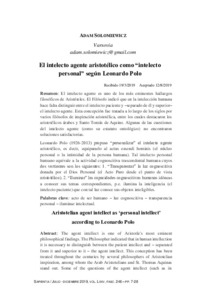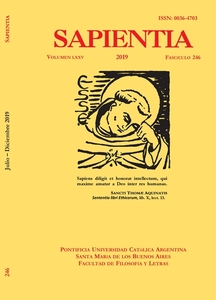Por favor, use este identificador para citar o enlazar este ítem:
https://repositorio.uca.edu.ar/handle/123456789/12086| Título: | El intelecto agente aristotélico como “intelecto personal” según Leonardo Polo Aristotelian agent intellect as ‘personal intellect’ according to Leonardo Polo |
Autor: | Solomiewicz, Adam | Palabras clave: | PERSONA HUMANA; INTELECTO; Aristóteles, 384-322 a.C.; COGNICION; FILOSOFIA TRASCENDENTAL; Polo, Leonardo, 1926-2013; TEORIA DEL CONOCIMIENTO | Fecha de publicación: | 2019 | Editorial: | Pontificia Universidad Católica Argentina. Facultad de Filosofía y Letras | Cita: | Solomiewicz, A. El intelecto agente aristotélico como “intelecto personal” según Leonardo Polo [en línea]. Sapientia. 2019, 75 (246). Disponible en: https://repositorio.uca.edu.ar/handle/123456789/12086 | Resumen: | Resumen: El intelecto agente es uno de los más eminentes hallazgos
filosóficos de Aristóteles. El Filósofo indicó que en la intelección humana
hace falta distinguir entre el intelecto paciente y –separado de él y superior–
el intelecto agente. Esta concepción fue tratada a lo largo de los siglos por
varios filósofos de inspiración aristotélica, entre los cuales destacaron los
aristotélicos árabes y Santo Tomás de Aquino. Algunas de las cuestiones
del intelecto agente (como su estatuto ontológico) no encontraron
soluciones satisfactorias.
Leonardo Polo (1926-2013) propuso “personalizar” el intelecto agente
aristotélico, es decir, equipararlo al actus essendi hominis (el núcleo
personal o la intimidad de la persona humana). Tal intelecto personal
humano equivale a la actividad cognoscitiva trascendental humana cuyos
dos vertientes son los siguientes: 1. “Transparentar” la luz cognoscitiva
donada por el Dios Personal (el Acto Puro desde el punto de vista
aristotélico). 2. “Iluminar” las capacidades cognoscitivas humanas idóneas
a conocer sus temas correspondientes, p.e. ilumina la inteligencia (el
intelecto paciente) que con tal luz conoce sus objetos inteligibles. Abstract: The agent intellect is one of Aristotle's most eminent philosophical findings. The Philosopher indicated that in human intellection it is necessary to distinguish between the patient intellect and – separated from it and superior to it – the agent intellect. This conception has been treated throughout the centuries by several philosophers of Aristotelian inspiration, among whom the Arab Aristotelians and St. Thomas Aquinas stand out. Some of the questions of the agent intellect (such as its ontological status) did not find satisfactory solutions. Leonardo Polo (1926-2013) proposed to “personalize” the Aristotelian agent intellect, that is, to equate it with the human actus essendi (the personal nucleus or intimacy of the human person). Such a human personal intellect is equivalent to transcendental human cognitive activity whose two aspects are the following: 1. "to transparent" the cognitive light donated by the Personal God (the Pure Act from the Aristotelian point of view); 2. to "illuminate" the human cognitive capacities suitable to know their corresponding themes, i.e. to illuminate the intelligence (the patient intellect) that with such light knows its intelligible objects. |
URI: | https://repositorio.uca.edu.ar/handle/123456789/12086 | ISSN: | 0036-4703 (impreso) | Disciplina: | FILOSOFIA | Derechos: | Acceso abierto | Fuente: | Sapientia. 2019, 75 (246) |
| Aparece en las colecciones: | SAP - 2019 Vol LXXV nro. 246 |
Ficheros en este ítem:
| Fichero | Descripción | Tamaño | Formato | |
|---|---|---|---|---|
| intelecto-agente-aristotelico-personal.pdf | 277,9 kB | Adobe PDF |  Visualizar/Abrir | |
| cover_issue_355_es_AR.jpg | 123,08 kB | JPEG |  Visualizar/Abrir |
Visualizaciones de página(s)
256
comprobado en 30-abr-2024
Descarga(s)
1.429
comprobado en 30-abr-2024
Google ScholarTM
Ver en Google Scholar
Este ítem está sujeto a una Licencia Creative Commons

